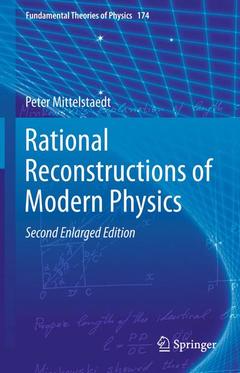Description
Rational Reconstructions of Modern Physics (2nd Ed., 2nd ed. 2013)
Fundamental Theories of Physics Series, Vol. 174
Author: Mittelstaedt Peter
Language: English
Subjects for Rational Reconstructions of Modern Physics:
Keywords
Copenhagen Interpretation of Quantum Mechanics; Einstein Synchronisation; Leibniz Statistics; Natanson Statistics; Ontology of Classical Physics; Orthomodular Quantum Logic; Quantum Ontology; Reconstruction Quantum Mechanics; Reconstruction Special Relativity and Relativity Theory; Reduction of Ontological Hypotheses
Publication date: 06-2015
Support: Print on demand
Publication date: 05-2013
141 p. · 15.5x23.5 cm · Hardback
Description
/li>Contents
/li>Biography
/li>Comment
/li>
In the second edition the rational reconstructions are completed with respect to General Relativity and Cosmology. In addition, the statistics of quantum objects is elaborated in more detail with respect to the rational reconstruction of quantum mechanics. The new material completes the approach of the book as much as it is possible at the present state of knowledge.
Presumably, the most important contribution that is added to the second edition refers to the problem of interpretation of the three great theories of Modern Physics. It is shown in detail that in the light of rational reconstructions even realistic interpretations of the three theories of Modern Physics are possible and can easily be achieved.
Prof. Dr. Peter Mittelstaedt is emeritus professor at the University of Cologne. His main research fields are Foundations of Quantum Theory, Relativity Theory, Philosophy of Science and Logic. He has published various books with Springer: "Laws of Nature" (2005, together with P.A. Weingartner), "The Quantum Theory of Measurement" (1996, together with P. Busch and P.J. Lahti) and "Quantum Logic" (1978).
Dr. Kristina Engelhard edited this 2nd enlarged edition of the book by Prof. P. Mittelstaedt. She obtained her PhD in Philosophy at the University of Cologne with a thesis entitled "The Simple and Matter. Inquiries into Kant’s Antinomy of Division" and she is currently Research and Teaching Assistant at the Philosophy Department of the University of Cologne (Germany).

